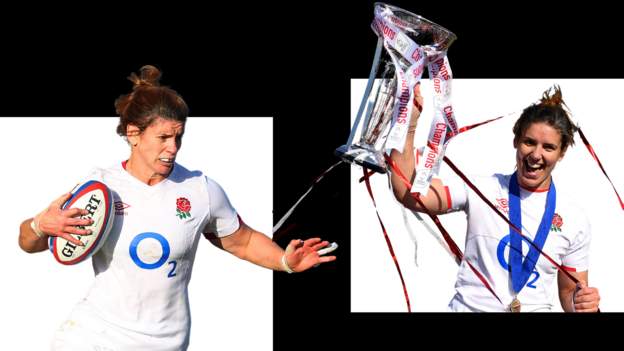
At every twist and turn of women's rugby's development for the past 16 years, Sarah Hunter has been there.
In the beginning, opportunities were limited.
North Shields-born Hunter fell into rugby league, aged nine, purely because her primary school headteacher was forward-thinking enough to insist on sessions for both boys and girls.
Like so many others at the time, the end of mixed rugby at the age of 12 brought big changes due to a lack of girls playing. Switching to rugby union was the only option.
Unaware of an England women's side until she was 16, Hunter made her debut five years later against Scotland in the 2007 Women's Six Nations.
Then, England's women had their own union and so could not wear the rose like the men's side could.
Now, Hunter leads a professional team fully integrated into the Rugby Football Union's plans.
That first cap came at Old Albanian Rugby Club in front of a few hundred people.
Hunter earns her record-extending 141st in her home city of Newcastle at a sold-out Kingston Park.
2014's 'penny-drop moment'
Hunter first thought the floodgates had opened for women's rugby after England beat Canada in Paris to win the 2014 World Cup.
The team went to a bar that had hosted family and friends throughout the tournament to celebrate.
Hunter tells BBC Sport they were "just expecting a few people".
"We got there and the streets were filled. Katy [Daley-Mclean] and I got off the bus together with the trophy to choruses of Swing Low, Sweet Chariot," she recalls.
"It wasn't just our friends and family, it was people who had come over to watch the game."
Hunter describes it as a "penny-drop moment" - and seeing images of the team on the front pages of English newspapers the next morning "was unheard of".
Television appearances with names such as Harry Potter's Daniel Radcliffe and a trip to Downing Street followed in a "surreal" aftermath.
'The defining moment' in 2022
There was disappointment when the RFU moved funding away from the 15s game towards sevens after the 2017 World Cup, but celebrations followed when the 15s team were given full-time contracts in 2019.
Last year England played a starring role in the biggest women's World Cup to ever take place.
After leading her country to a record 30-Test winning run, before losing a third World Cup final to New Zealand following defeats in 2010 and 2017 too, Hunter says it still feels "really raw".
But there are "mixed emotions" because of the leap forward for women's rugby.
The final was played in front of a record crowd of 42,579 at New Zealand's Eden Park.
England hope to surpass that when they play France at Twickenham in the Women's Six Nations on 29 April, with around 35,000 tickets already sold.
Hunter says: "What that World Cup did, and what being part of the Red Roses team has done for the women's game, is huge.
"I will always be immensely proud to have been part of that. We can't look back and say we will wait four years for it to be bigger. We've got to push on and make that the norm.
"Hopefully we'll look back and make that the defining moment once and for all."
What next for women's rugby?
Hunter will not play in what could be another game-changing World Cup in 2025 on home soil, but hints she would like to be involved in some capacity.
England need a new head coach, with Simon Middleton bowing out after the 2023 Women's Six Nations.
Hunter says it is too soon for her to take the job, but to do so further down the line would be "an absolute honour".
Typical of her commitment to the sport, she adds the Red Roses have "far progressed" from someone taking charge simply "because they've played to a certain standard".
Attendances are up and all teams in the Women's Six Nations are offering some form of contract to their players for the first time.
But the journey is not over yet.
The development of Hunter's career and women's rugby have been entwined for the past 16 years, so she is best-placed to say what comes next.
With England's Premier 15s league increasingly competitive, Hunter hopes to see a "real professional, domestic league, fully paid at a level where it's a really good salary so that people can focus on it".
A European competition for women - like the men's Champions and Challenge Cups - is also on Hunter's wishlist, as are sold-out Red Roses games at Twickenham.
For now, all that is left for Hunter is a fairytale finish at Kingston Park - on whose fields she first tried rugby union and where she previously sold matchday programmes so she could watch Newcastle Falcons.
And afterwards? She will need to celebrate a career as one of English rugby's most faithful and humble leaders.
Of Saturday evening in Newcastle, Hunter adds: "They say the best nights are always the ones that are not planned."















 Phone: (800) 737. 6040
Phone: (800) 737. 6040 Fax: (800) 825 5558
Fax: (800) 825 5558 Website:
Website:  Email:
Email: 






